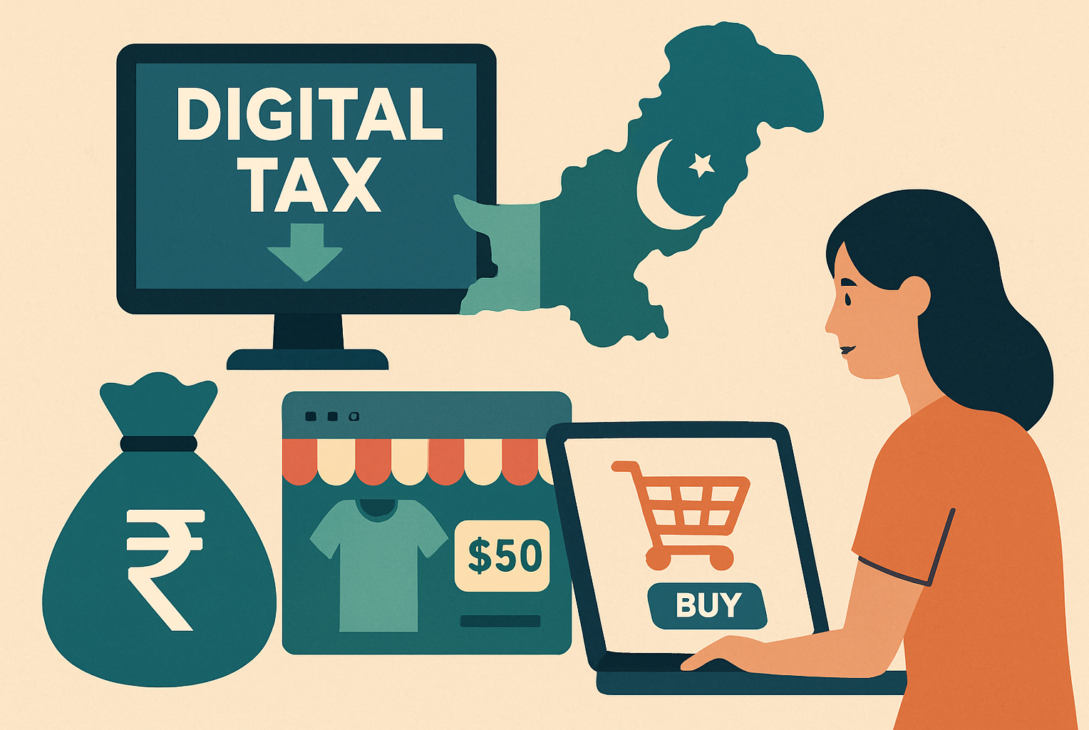In a significant move for Pakistan’s e-commerce sector, the Federal Board of Revenue (FBR) recently reversed the 5% Digital Presence Proceed Tax on overseas vendors, effective retroactively from July 1, 2025. Initially introduced in the federal budget announced in June 2025, this tax had driven price hikes on popular international retail platforms like Temu, Shein, and AliExpress. The reversal has sparked optimism for price moderation, but stakeholders caution that a full return to pre-budget pricing is unlikely.
This blog post dives into the implications of the digital tax reversal for Pakistan’s rapidly growing e-commerce market, its impact on online shoppers, and the challenges faced by local and international digital retailers. With 195% growth in online transactions from 2020 to 2024 and a 402% surge in transaction value, Pakistan’s digital commerce sector is at a pivotal moment. Let’s explore what this policy shift means for consumers, businesses, and the future of e-commerce in Pakistan.
Why Was the Digital Tax Introduced?
Background of the Digital Presence Proceed Tax
The Digital Presence Proceed Tax was introduced in June 2025 to level the playing field between local and international e-commerce platforms. Local businesses, burdened with a 25% tax rate, argued that foreign retailers like Temu and Shein were undercutting them by operating with minimal tax obligations. These international platforms leveraged Pakistan’s growing appetite for affordable online shopping, especially for price-sensitive consumers.
“We were paying 25% in taxes, while foreign companies sold in Pakistan via social media without facing any local tax obligations. Their growth came at our expense,” said an executive from a leading local online retail platform, speaking anonymously.
The tax aimed to address these concerns but led to unintended consequences, such as price surges across international platforms. For instance, a kitchen jar priced at Rs500 jumped to Rs2,500, and a watch costing Rs63,000 soared to over Rs200,000. These hikes frustrated consumers and eroded the customer base of foreign retailers.
Impact of the Tax Reversal on E-Commerce Platforms
Price Moderation Expectations
The reversal of the 5% digital tax is expected to bring some relief to consumers. Prices on platforms like Temu, Shein, and AliExpress are anticipated to decline, though not to pre-budget levels. Stakeholders in the e-commerce ecosystem remain cautious, citing the following reasons:
- Inventory and Supply Chain Challenges: Foreign retailers may have raised prices to preempt policy changes or due to supply shortages caused by high demand in Pakistan.
- Customer Retention: The significant price hikes led to a loss of price-sensitive customers, and regaining their trust will take time.
- Operational Costs: Local platforms now face stricter compliance requirements, such as transacting only with tax-compliant suppliers, which increases their costs and impacts pricing.
Despite these challenges, the FBR’s notification (SRO No 1366(l)2025), available on their official website, signals a commitment to fostering a competitive digital market. However, the duty-free limit for online purchases remains unchanged at Rs500, down from Rs5,000 before the budget. This means goods valued above Rs500 are still subject to duties, limiting the extent of price reductions.
The Growth of Pakistan’s E-Commerce Market
A Booming Digital Economy
Pakistan’s e-commerce sector has witnessed explosive growth over the past five years. According to Mutaher Khan, co-founder of Data Darbar, a startup tracking Pakistan’s digital market:
- In 2020, Pakistan recorded 14.6 million online transactions worth Rs43.4 billion.
- By 2024, transaction volume grew by 195% to 43.1 million, with a total value of Rs218.1 billion, a 402% increase.
This growth reflects the increasing adoption of online shopping platforms among Pakistan’s middle-income segment, driven by convenience and competitive pricing. However, the recent tax changes and price surges have disrupted this momentum, particularly for international retailers.
Challenges for Local E-Commerce Businesses
Local e-commerce platforms, despite benefiting from increased sales post-budget, face unique challenges:
- Stricter Compliance: The requirement to work only with tax-compliant suppliers has raised operational costs.
- Competition with Offline Businesses: Shujaat Ameer, Chief Business Officer at Fetch Sky Technologies, highlighted the disparity in oversight. “Cash-based offline businesses operate with little scrutiny, while e-commerce platforms face stricter compliance, stifling innovation,” he said.
- Rising Costs: Higher compliance costs are passed on to consumers, affecting affordability.
Despite these hurdles, local platforms reported a surge in website traffic and order volumes in July 2025, indicating resilience in the face of policy shifts.
How Online Shoppers Are Affected
Frustration Among Consumers
The price surges on international platforms have left Pakistani shoppers, particularly the middle-income segment, frustrated. A young working mother shared her experience:
“It wasn’t just about convenience; the price difference made it worthwhile. I used to place two to three orders a week, but I’ve stopped now. A kitchen jar I bought for Rs500 is now Rs2,500. A watch I gifted for Rs63,000 is now over Rs200,000. It’s crazy.”
This sentiment is echoed across Pakistan’s online shopping community, where affordability was a key driver of e-commerce adoption. The duty-free limit reduction from Rs5,000 to Rs500 has further limited access to affordable international goods, pushing consumers toward local platforms or offline alternatives.
Opportunities for Price Moderation
With the digital tax reversal, consumers can expect some relief. However, the pace of price moderation will depend on how quickly international retailers adjust their pricing strategies and rebuild their inventory to meet Pakistan’s demand. Local platforms, meanwhile, are also seeing price increases as they navigate higher operational costs.
The Road Ahead for Pakistan’s E-Commerce Sector
Balancing Innovation and Regulation
The digital tax reversal is a step toward fostering a competitive e-commerce environment, but challenges remain. Policymakers must strike a balance between supporting local businesses and encouraging digital innovation. Shujaat Ameer emphasized the need for a digital-friendly approach:
“The current policy mindset, shaped more by tax enforcers than visionary economic leadership, risks slowing the positive momentum of digital business growth in Pakistan.”
Opportunities for Growth
Despite these challenges, Pakistan’s e-commerce market is poised for continued growth. The 402% surge in transaction value from 2020 to 2024 underscores the potential of digital commerce to drive economic progress. To sustain this momentum, stakeholders suggest:
- Streamlined Regulations: Simplify compliance for e-commerce platforms to reduce costs.
- Incentives for Innovation: Offer tax breaks or subsidies to encourage digital startups.
- Consumer Education: Raise awareness about the benefits of local platforms to retain customers.
- Investment in Infrastructure: Improve logistics and payment systems to enhance the online shopping experience.
Conclusion: A Pivotal Moment for Pakistan’s Digital Market
The digital tax reversal marks a turning point for Pakistan’s e-commerce sector. While it offers hope for price moderation on platforms like Temu, Shein, and AliExpress, the road to recovery is complex. Local businesses face increased costs, and consumers are grappling with higher prices and reduced duty-free limits. However, with strategic policy reforms and a focus on innovation, Pakistan’s digital market can continue its impressive growth trajectory.















